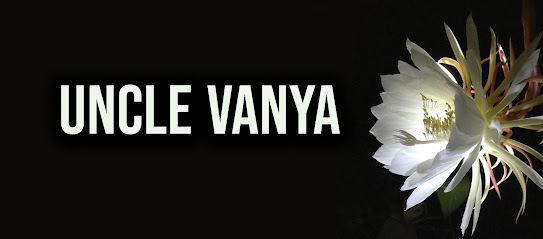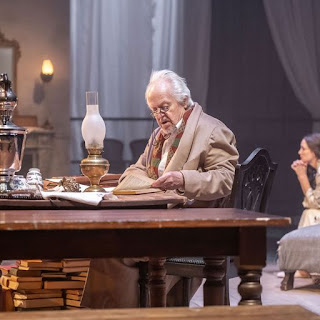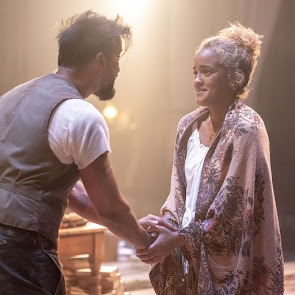CROW'S THEATRE UNTIL OCTOBER 2ND
The current Crow's Theatre production of Uncle Vanya captures all of the comic pathos essential to a script that can seem bleak at the best of times. Lisa Repo Martel's brilliant adaptation contains a slick contemporaneity that allows the dialogue to move quickly, with flashpoint moments of quick-witted dialogue - words and emotions combust, ignite, and become the flame of language Chekhov so eloquently exemplifies in his work.
Matched by fast-paced, expansive direction by Chris Abraham, the overall experience becomes an epic portrayal of a decaying culture wrought by the conflict between city and country. The devastation of nature becomes a thematic testament to the playwright's concerns for an earth ravaged by over-development and a thirst for capital. The only thing Chekhov got wrong was the timeline. It did not take a hundred years for the world to acknowledge the damage that has been done - the stupidity and the tastelessness that litters both urban and rural landscapes. But it is taking forever for reparations to materialize in any profound way.
A beautiful and engaging semi- environmental set by Julie Fox allows the audience to feel as though we are part of the action as actors sweep to and fro in the midst of a large playing space that inhabits every corner - within and beyond the viewer's eye and yet always a sensory and scenic success. Lighting (Kimberly Purtell) and sound (Thomas Ryder Payne) collaborate in a smoky, enticing haze of aural and visual delight and atmospheric annotation.
The ensemble is remarkable as they play and squabble with fast-paced conversational flair and intense emotional fervour. Scenes near the end with Sonya begging Vanya to cooperate reach peaks of poignant pleading that could have seemed too emphatic in the hands of another, less layered, performer. And yet Bahia Watson's Sonya somehow delivers a seamless performance that allows the most pessimistic of Chekhov's lines and sentiments to soar into a believable and engaging characterization.
Eric Peterson's Alexandre brilliantly portrays the brilliant, blustering and boorish gadabout dominating a family that has selflessly responded to his every need. Shannon Taylor's Yelena creates an elegant, subservient young wife to Alexandre's infamous fading charm - engaging with Sonya and Astrov with varied and complex emotion as she navigates her position as the bored beauty. Ming Wong's costumes excel in Yelena's simple classic dress forms, and move into varied tones and beautifully contrasting patterns and vibrancies in dtaborah johnson's layered ensembles.
Anand Rajaram, dtaborah Johnson, and Carolyn Fe take on secondary roles that provide the solid sense of family and community that holds the overall structure together, delivering performances that punctuate the emotional narrative, and fill the space with layered characterizations of a family dependent and devoted to all the people they must love in a day.
Together, as warring friends ultimately separated by their love for the same woman, Tom Rooney as Vanya and Ali Kazmi as Astrov bring two emphatic kinds of romantic energy to the stage that makes for a complex and thrilling way of perceiving love and desire. Their physicalization and vocal diversity create such convincing portrayals that one might wish they could both win in this tortured game of love, or better yet, fall in love with each other's grand desires.
But of course, no one fully triumphs in Chekhov, but still, the emotion engages, runs high, and overflows in a boiling pot of tragicomic familial stew - simmering, bubbling, and overcooking emotion for an audience whose tastebuds are never disappointed in this wonderful adaptation of a timeless play addressing the humanity and the inhumanity of so-called civilization.
How's that for a string of menu metaphors creating fabulous and theatrical food for thought. Alliterative. Dramaturgical. Delicious!!!
PHOTOS BY DAHLIA KATZ
Shannon Taylor as Yelena
Carolyn Fe as Marina
Ali Kazmi asAstrov
dtaborah johnson as Maria
Tom Rooney as Vanya
RUNNING AT CROW'S THEATRE
UNTIL OCTOBER 2ND



















